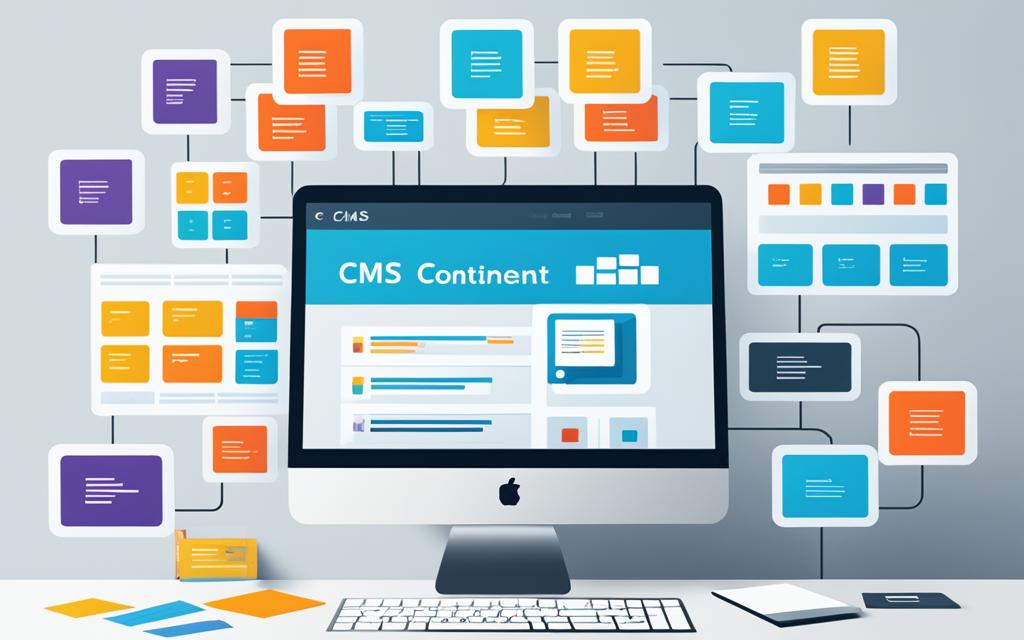Content Management Systems (CMS): Simplify Your Web
Did you know WordPress runs over 40% of websites online? It leads the CMS market with a huge 62.5% share12. This fact shows how crucial Content Management Systems (CMS) are today. They help businesses grow online by making web management easy.
With CMS, anyone can create, manage, and share online content without needing tech skills. Platforms like WordPress make it easy for companies to run their sites well. This saves time and lets them focus on their main goals.
Choosing the right CMS is key to success in a crowded market. It can make a big difference in how well you manage your website.
Key Takeaways
- WordPress holds over 62.5% of the CMS market share.
- Choosing the right CMS can significantly enhance your web management efficiency.
- CMS platforms facilitate SEO optimization through customizable URLs and meta tags.
- Popular CMS options include Joomla, Drupal, Magento, and Shopify.
- Most CMS platforms allow for easy content collaboration among users.
Understanding Content Management Systems (CMS)
A content management system (CMS) is key for handling digital content well. It’s vital for businesses and individuals wanting to improve their online presence. Most CMSs have two main parts—the front end and the back end3. Some CMSs, known as traditional ones, need their own web hosting. Others, like SaaS CMS, run in the cloud, making setup easy3. Since the late 1990s, user-friendly CMS tools have become more common, thanks to platforms like PHP-Nuke4.
Today, CMSs offer many features like responsive design, SEO tools, and support for multimedia. This makes content easy to access and fun to use4. The rise of WordPress in 2003 helped grow the CMS market. It brought advanced features to users who aren’t tech-savvy4. Digital asset management and user roles are key in any CMS. They help with content sharing and keeping things organized in the cloud3
Why You Need a CMS for Your Website
Today, businesses must find an efficient way to manage their digital content. With the fast pace of marketing, the importance of website management is huge. Over 68 million websites use content management systems (CMS) to make managing easier and keep their online presence consistent5.
A CMS makes managing your site simpler and boosts the benefits of CMS. It lets non-tech people update content easily.
Platforms like WordPress come with features that help websites rank better on search engines. This is a big reason why they’re so popular6. The ease of website updates is key for quick and effective communication with your audience. It lets you edit and add new content fast, keeping your site fresh.
Also, CMS solutions offer tools like content scheduling. This makes planning and publishing content easier, boosting efficiency7. Companies without a big IT team can still keep their brand strong and share info well without needing lots of tech skills.
Benefits of Using a Content Management System (CMS)
Using a content management system (CMS) changes how we handle online content. It brings many CMS advantages that make the process smoother. These platforms make it easy for marketers and developers to work together smoothly8.
They also let you set up workflows for different digital channels, making managing your work easier8. With these tools, many people can work on content at the same time. This makes working together on digital projects a breeze9.

CMS solutions can cut down the time it takes to make content by a lot. They have easy-to-use editors that let creators upload stuff without needing to know HTML or CSS9. Everything is managed from one place, making it a cost-effective way to improve customer experiences8.
These systems also have strong analytics that help track important metrics. This lets companies change their marketing plans quickly8. Plus, they have built-in SEO and can send content to all digital places, helping with search visibility8.
Choosing the right CMS makes managing content easier and helps businesses grow and work better9. By picking a platform that supports different content types and works with key marketing tools, companies can do well in the digital world.
Popular Content Management Systems on the Market
WordPress is the top choice for managing content, running about 43% of all websites worldwide10. It’s known for its flexibility, making it great for blogs and big business sites alike11. Joomla! and Drupal are also popular, each with their own set of features for different users and skill levels.
HubSpot CMS Hub is another big name, with plans starting at $23 a month10. It’s perfect for businesses looking to boost their marketing and customer service with HubSpot’s tools.
Open-source CMS like WordPress and Drupal are highly customizable, thanks to their large communities11. On the other hand, enterprise CMS solutions are built for big companies. They offer the scalability, security, and performance needed for large operations.
How Content Management Systems Improve Workflow
Content management systems (CMS) make workflow better by offering a single place for team members to work together. They have tools for collaboration that help teams go through the steps of making content, checking it, approving it, and sharing it12. This method is key for keeping content quality high and making teams work more efficiently with CMS.
Headless CMS has changed how we manage content, bringing a new way that’s flexible and quick12. This is important because it helps teams work better with different digital marketing tools. Also, headless CMS uses APIs to connect easily with other apps and platforms12.
These changes have made it easier for teams to work together, thanks to easy-to-use interfaces that make managing content simpler12. CMS tools like task lists, publishing calendars, and alerts help teams work from anywhere, keeping projects on track with marketing plans12. With choices like WordPress and Drupal, knowing which features to use, like publishing controls and editing tools, can make teams work even better with CMS13.
Choosing the Right CMS for Your Business
When picking a CMS, it’s crucial to think about now and what you might need later. It’s important to make sure the platform fits your goals. With 59% of customer service leaders seeing the value in smooth customer journeys, it’s clear this matters a lot14.
Having a diverse CMS selection team and support from top leaders can really help in making a choice15. As you look at different systems, comparing their features will show which ones, like Optimizely, Sitecore, Contentful, and WordPress, are right for you.
Don’t forget to consider SEO when choosing a CMS; it’s key for getting noticed online and bringing in more visitors. The cost of CMS options varies widely, from free open-source like Drupal to pricey enterprise solutions14. A detailed RFP can help vendors show how they can meet your specific needs and goals15.
After getting responses from vendors, check them against your technical, functional, and business needs. If you don’t have the right team for development, think about hiring an implementation partner or a digital strategy agency15. Also, look for a CMS that works well with other systems to boost efficiency and support across all channels, which can make customers more engaged14.

Content Management Systems (CMS) and SEO
Content Management Systems (CMS) are key for better search engine optimization (SEO). They offer CMS features for SEO like easy indexing and search. This helps marketers manage and share their online content well. In fact, 64% of marketers spend on SEO to boost their marketing16.
Over 60% of people use mobile devices for searching online, making responsive themes crucial16. CMS tools help optimize things like titles, meta descriptions, and URLs. This makes improving SEO easier17.
Websites with SSL certification rank higher in search results because Google favors secure sites16. A well-organized CMS makes it easy to find all digital assets. This boosts visibility and brings in more visitors. Tools for analytics help teams tweak strategies based on how users interact with content18.
Features like auto-generated sitemaps and 301 redirects are key for checking content and making sure it can be crawled16. As digital marketing changes, using the SEO benefits of CMS is more important than ever. These tools help businesses meet customer needs and improve the user experience. This leads to stronger customer ties and success to effectively use CRM data.
The Future of Content Management Systems
The future of managing digital content is changing fast. New trends in CMS are changing how businesses handle their content. The market for Content Management Software was about US $17.5 billion in 2021. It’s expected to grow by 6.5% each year, reaching over US $25.5 billion by 202819.
More people are working remotely and using digital content. This has made CMS tools more popular. Now, nearly 75 million live websites use these systems20.
Headless CMS solutions are becoming more popular. They let you create content in many formats. This change means content management is becoming more flexible and easy to scale20. The headless CMS market was worth US $490 million in 2021. It’s expected to grow by 20.5% a year, reaching US $1.5 billion by 202719.
AI and machine learning are changing CMS. They help automate content creation and make sure it reaches the right people. This can increase engagement and help businesses make more money20.
Cloud-based solutions are becoming more common. They offer lower costs, better collaboration, and more room to grow. More companies will offer these solutions soon20.
Conclusion
Using a content management system (CMS) is key for businesses wanting a strong online presence. It makes managing content easy and helps with collaboration and SEO. This keeps companies competitive and ready for market changes.
Popular platforms like WordPress and Shopify show how well these systems work. They make managing websites easier and make sure they look good and work well.
Choosing the right CMS helps companies manage their websites better. This lets them focus on what they do best and connect with customers. In today’s fast-paced market, being quick to adapt is important. Tools that work well with other apps make this easier, helping with making and sharing content.
Using a CMS to improve your online presence means more people will see and interact with your business. This can lead to growth. As the digital world changes, using the right CMS is essential for success in any field for businesses212223.
FAQ
What is a Content Management System (CMS)?
A Content Management System (CMS) is a software tool. It helps create, manage, and publish web content easily. You don’t need technical skills or coding knowledge.
Why is a CMS important for businesses?
Today, a CMS is key for businesses to stay strong online. It helps reach customers and boost sales by making web content easy to manage.
What are the advantages of using a CMS?
Using a CMS has many benefits. It makes creating content easy, helps teams work together, manages workflows, improves SEO, and offers real-time analytics for marketing tweaks.
Which CMS platforms are the most popular?
WordPress, Joomla!, and Drupal are top CMS platforms. WordPress alone powers over 40% of all websites. Each platform has special features for different business needs, like for big companies and online stores.
How do CMS systems enhance workflow?
CMS systems make workflow better by offering a single place for team work. They have features like user roles, task lists, publishing schedules, and alerts. These help teams work more efficiently.
What should I consider when choosing a CMS?
When picking a CMS, think about what your business needs. Look at ease of use, how it grows with your business, compatibility, SEO help, security, and team tools.
How do CMSs contribute to SEO?
CMS systems boost SEO with tools for managing metadata, SEO-friendly URLs, organizing content, and tracking user actions. This helps improve visibility and bring in more visitors.
What are the current trends in CMS technology?
CMS technology is evolving with headless and decoupled CMS, cloud solutions, and new tech like machine learning and AI. These changes will make content more personalized and easier to integrate.
Source Links
- https://kinsta.com/knowledgebase/content-management-system/
- https://www.linkedin.com/pulse/content-management-systems-cms-simplifying-web-sweety-bains-zevac
- https://www.oracle.com/content-management/what-is-cms/
- https://www.cmswire.com/digital-experience/what-is-a-content-management-system/
- https://blog.hubspot.com/blog/tabid/6307/bid/7969/what-is-a-cms-and-why-should-you-care.aspx
- https://erieit.edu/beginners-guide-content-management-systems/
- https://www.theedigital.com/blog/top-reasons-to-use-a-content-management-system
- https://www.acquia.com/blog/benefits-of-content-management-system
- https://www.optimizely.com/optimization-glossary/content-management-system/
- https://www.wpbeginner.com/showcase/best-cms-platforms-compared/
- https://expertinsights.com/insights/the-top-content-management-systems/
- https://kontent.ai/blog/content-management-workflow/
- https://www.ibm.com/topics/content-management-system
- https://www.verndale.com/insights/cms/7-factors-for-choosing-the-right-cms
- https://www.sitecore.com/explore/topics/content-management/how-to-choose-a-cms
- https://blog.hubspot.com/website/best-cms-for-seo
- https://www.geeksforgeeks.org/seo-for-content-management-systems-cms/
- https://www.techtarget.com/searchcontentmanagement/definition/content-management-system-CMS
- https://www.tiny.cloud/blog/cms-trends-you-need-to-know/
- https://medium.com/@hassanalzaza83/the-future-of-cms-predictions-and-trends-in-content-management-systems-4ecfedfd0490
- https://monovm.com/blog/what-is-a-cms/
- https://en.ryte.com/wiki/Content_Management_System
- https://www.simpletiger.com/resources/glossary/content-management-system-cms







